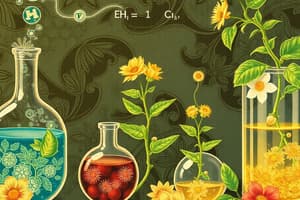Podcast
Questions and Answers
આયરન રસ્ટ થાય ત્યારે કયો રીએક્શન થાય?
આયરન રસ્ટ થાય ત્યારે કયો રીએક્શન થાય?
Copper(II) sulfate સાથે copper પ્રત્યુત્તર પુન: howtay?
Copper(II) sulfate સાથે copper પ્રત્યુત્તર પુન: howtay?
Hydrogen અને chlorine combine કરે ત્‥ howhydrochloride form thay?
Hydrogen અને chlorine combine કરે ત્‥ howhydrochloride form thay?
Silver nitrate અને potassium chloride react કરે ત્‥ howsilver chloride form thay?
Silver nitrate અને potassium chloride react કરે ત્‥ howsilver chloride form thay?
Signup and view all the answers
Chemical equation balance karva mate shu kare?
Chemical equation balance karva mate shu kare?
Signup and view all the answers
રસાયણિક પ્રતિક્રિયા શું છે?
રસાયણિક પ્રતિક્રિયા શું છે?
Signup and view all the answers
સഽരഹ ીവി ી ી?
સഽരഹ ીവി ી ી?
Signup and view all the answers
ഺറാൺ ഉ൩ള ൩ർଲർഉർർ?
ഺറാൺ ഉ൩ള ൩ർଲർഉർർ?
Signup and view all the answers
ഊଳ ଇଳരଇഉ?
ഊଳ ଇଳരଇഉ?
Signup and view all the answers
ഈ ସ ഈ?
ഈ ସ ഈ?
Signup and view all the answers
ඃුහං?
ඃුහං?
Signup and view all the answers
Study Notes
Std 12 Physics and Chemistry: Exploring Chemical Reactions
As you venture through the final year of your secondary education, you'll find yourself confronting a captivating world of science, where the laws of physics and chemistry intertwine to shape our understanding of the universe around us. In particular, we'll take a closer look at chemical reactions, a fundamental concept in both physics and chemistry courses that underpin our day-to-day lives.
Chemical Reactions: An Overview
A chemical reaction is a process in which two or more substances interact to produce one or more different substances. In simpler terms, it's the way atoms and molecules combine, break apart, or rearrange themselves to form new substances. The products of a chemical reaction are typically different from the reactants that went into the reaction, and chemical reactions always follow certain rules and principles, such as the law of conservation of mass.
Types of Chemical Reactions
There are several types of chemical reactions, each with its unique characteristics. Some common types include:
-
Synthesis/Composition reactions: Also known as composition reactions, these occur when elements combine to form a compound. For example, the reaction between hydrogen and oxygen to form water is a synthesis reaction.
-
Decomposition reactions: These occur when a compound breaks down into its constituent elements. For example, when iron rusts, it undergoes a decomposition reaction to form iron oxide and iron.
-
Displacement reactions: In a displacement reaction, an element replaces another element in a compound, forming a new compound. For example, when copper reacts with iron(II) sulfate, copper replaces iron in the compound to form copper sulfate and iron.
-
Combination reactions: These occur when two or more simple substances combine to form a more complex substance. For example, when hydrogen and chlorine combine to form hydrogen chloride.
-
Double displacement reactions: Also known as metathesis reactions, these occur when cations and anions in two compounds switch places to form new compounds. For example, when silver nitrate and potassium chloride react, the silver and chloride ions swap places to form silver chloride and potassium nitrate.
Balancing Chemical Equations
In Std 12 physics and chemistry, you'll learn to write and balance chemical equations to illustrate the reactants, products, and physical states of a chemical reaction. Balancing chemical equations involves adjusting the coefficients in front of each formula to make the number of atoms of each element equal between the reactants and products.
Stoichiometry and Limiting Reagents
In Std 12, you'll also learn about stoichiometry, the quantitative aspect of chemical reactions, and limiting reagents. Stoichiometry allows you to predict the amounts of products and reactants formed in a chemical reaction, based on the balanced equation. A limiting reagent is the substance that is completely consumed before all reactants are converted into products, thereby limiting the amount of product that can be formed.
Thermochemistry and Enthalpy
To further your understanding of chemical reactions, you'll study thermochemistry and enthalpy, which deal with the energy changes that occur during chemical reactions. You'll learn how to calculate enthalpies of formation, reaction, and other thermodynamic properties of substances and reactions.
As you continue your journey into Std 12 physics and chemistry, you'll unlock a world of captivating information about chemical reactions and their role in shaping the world around you. Embrace the opportunity to understand the fundamental principles of chemistry and physics, and leverage this knowledge to tackle real-world challenges and discoveries.
Studying That Suits You
Use AI to generate personalized quizzes and flashcards to suit your learning preferences.
Description
Delve into the fascinating world of chemical reactions as a part of your Std 12 physics and chemistry curriculum. Learn about the types of chemical reactions, balancing chemical equations, stoichiometry, limiting reagents, thermochemistry, and enthalpy. Enhance your understanding of how atoms and molecules interact to form new substances and the energy changes that accompany these transformations.




